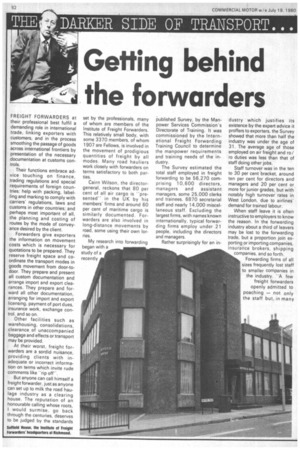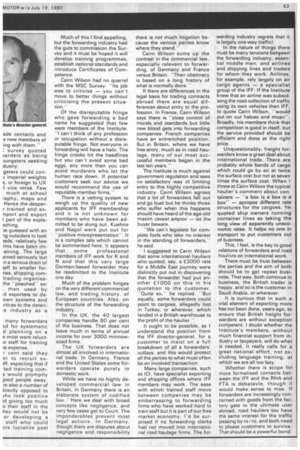Getting behind the forwarders
Page 54

Page 55

If you've noticed an error in this article please click here to report it so we can fix it.
FREIGHT FORWARDERS at their professional best fulfil a demanding role in international trade, linking exporters with customers, and in the process smoothing the passage of goods across international frontiers by presentation of the necessary documentation at customs controls.
Their functions embrace advice touching on finance, trading regulations and special requirements of foreign countries; help with packing, labelling and marking to comply with carriers' regulations, laws and customs in other countries; and perhaps most important of all, the planning and costing of routes by the mode of conveyance desired by the client.
Forwarders give exporters the Information on movement costs which is necessary for quotations to be prepared. They reserve freight space and coordinate the transport modes in goods movement from door-todoor. They prepare and present all custom documentation and arrange import and export clearances. They prepare and forward all other documentation, arranging for import and export licensing, payment of port dues, insurance work, exchange control, and so on.
Other facilities such as warehousing, consolidations, clearance of unaccompanied baggage and effects or transport may be provided.
At their worst, freight forwarders are a sordid nuisance, providing clients with inadequate or incorrect information on terms which invite rude comments like "'rip off' '.
But anyone can call himself a freight forwarder, just as anyone can set up to milk the road haulage industry as a clearing house. The reputation of an honourable calling whose roots, I would surmise, go back through the centuries, deserves to be judged by the standards set by the professionals, many of whom are members of the Institute of Freight Forwarders. This relatively small body, with some 3370 members, of whom 1907 are Fellows, is involved in the movement of prodigious quantities of freight by all modes. Many road hauliers work closely with forwarders on terms satisfactory to both parties.
Cairn Wilson, the directorgeneral, reckons that 80 per cent of all air cargo is "'presentedin the UK by his members' firms and around 60 per cent of maritime cargo is similarly documented. Forwarders are also involved in long-distance movements by road, some using their own lorries.
My research into forwarding began with a study of a recently published Survey, by the Manpower Services Commission's Directorate of Training. It was commissioned by the International Freight Forwarding Training Council to determine the manpower requirements and training needs of the industry.
The Survey estimated the total staff employed in freight forwarding to be 56,270 comprising 10,600 directors, managers and assistant managers, some 25,000 clerks and trainees. 6870 secretarial staff and nearly 14,000 miscellaneous staff. Excluding the largest firms, with names known internationally, typical forwarding firms employ under 21 people, including the directors and managers.
Rather surprisingly for an in
dustry which justifies its existence by the expert advice it proffers to exporters, the Survey showed that more than half the industry was under the age of 31. The average age of those employed on air freight and ro/ ro duties was less than that of staff doing other jobs.
Staff turnover was in the ten to 30 per cent bracket, around ten per cent for directors and managers and 20 per cent or more for junior grades, but with notably high turnover rates in West London, due to airlines' demand for trained labour.
When staff leave it is often instructive to employers to know the reason. In the forwarding industry about a third of leavers may be lost to the forwarding trade, but a proportion join exporting or importing companies, insurance brokers, shipping companies, and so forth.
Forwarding firms of all sizes frequently lost staff to smaller companies in
the industry. -A few freight forwarders openly admitted to poaching — not only the staff but, in many
ade contacts and e new members of ing with them."' survey quoted varders as being )ungsters seeking dustry.
gsters could con) imperial weights s, or foreign to UK vice versa. Few much at school raphy, maps and Hence the desperr trained and exnport and export I part of the explaaching.
3e guessed with an outsiders to look )eds, relatively few rms have been int-aining. The large ained seriously but .n a serious drain of taff to smaller fornes, shipping corntrading organisethe "poached" ex, then used by
d exporters to deown systems and ctices to the deteri e industry as a many forwarders ad for systematic d planning on a a most were reluct e staff for training se expense.
r cent said they er to recruit ex)ff. expecting that if led training corn s would promptly 3ood people away. re also a number of iirectly opposed to who took positive id giving too much o their staff in the hey would not be or developing a staff who could ore lucrative post Much of this I find appalling, but the forwarding industry had the guts to commission the Survey and it must be hoped it will develop training programmes, establish national standards and introduce Certificates of Competence.
Cairn Wilson had no quarrel with the MSC Survey. "Its job was to criticise — you can't move to better things without criticising the present situation."
Of the disreputable fringe who gave forwarding a bad name he suggested that few were members of the Institute. "I can't think of any profession or occupation without a disreputable fringe. Not everyone in forwarding will have a halo. The fringe crooks hit the headlines but you can't avoid some bad eggs, any more than you can avoid murderers who let the human race down. If potential customers seek our advice we would recommend the use of reputable member firms."
There is a vetting system to weigh up the quality of new applicants for IFF membership and it is not unknown for members who have been admitted to be slung out. Kuehne and Nagel were put out for "positive misrepresentation". It is a complex tale which cannot be summarised here. It appears that some professional members of IFF work for K and N and that this very large German-based forwarder may be readmitted to the Institute one day.
Much of the problem hinges on the very different commercial law, and trading history, of European countries. Also, on the structure of the forwarding industry.
In the UK, the 40 largest companies handle 80 per cent of the business. That does not leave much in terms of annual income for over 3000 minnowsized firms.
The UK forwarders are almost all involved in internatio nal trade. In Germany, France and the United States some forwarders operate purely in domestic work.
While we have no highly developed commercial law in Britain, in Germany there is an elaborate system of codified law. "Here we deal with broad concepts like negligence, and very few cases get to Court. The imponderables prevent most legal actions. In Germany, though there are disputes about negligence and responsibility there is not much litigation because the various parties know where they stand .
Cairn Wilson sums up the contrast in the commercial law, especially relevant to forwarding, of Germany and France versus Britain. "Their obstinacy is based on a long history of what is normally done."
If there are differences in the legal basis for trading contracts abroad there are equal differences about entry to the profession. In France, Cairn Wilson says there is "close control of morals and standards but little new blood gets into forwarding companies. French companies have an entrenched position. But in Britain, where we have free entry, much as in road hau lage, many of our most successful members began in the last ten years."
The Institute is much against government regulation and sees no satisfactory way of limiting entry to this highly. competitive industry. Cairn Wilson agrees that a lot of forwarders fall out and go bust but he thinks those who suffer when this happens should have heard of the age-old maxim caveat emptor — let the buyer beware.
"We can't legislate for complete fools who take no interest in the standing of forwarders," he said.
I suggested to Carin Wilson that some international hauliers who quoted, say, a £3000 rate for a Middle East journey were distinctly put out in discovering that the forwarder had put another £1000 on this in his quotation to the customer.
"Quite so," he replied. "But equally, some forwarders could point to cargoes, allegedly lost in Turkey, or wherever, which landed in a British warehouse to the profit of the haulier."
It ought to be possible, as I understand the position from the IFF director-general, for a customer to insist on a full breakdown of all a forwarders' outlays; and this would protect all the parties to what must often be an involved transaction.
Many large companies, such as ICI, have specialist exporting and shipping offices where IFF members may work. The ease with which trained staff move between companies may be embarrassing to forwarding firms who have worked hard to train staff but it is part of our free
market economy. I'd be surprised if no forwarding clerks had not moved into international road haulage firms. The for
warding industry regrets that it is largely one-way traffic!
In the nature of things there must be many tensions between the forwarding industry, essen tial middle men, and airlines and shipping lines and traders for whom they work. Airlines, for example, rely largely on air cargo agents — a specialist group of the 1FF. If the Institute knew that an airline was subsidising the road collection of traffic using its own vehicles then IFF, to quote Cairn Wilson, "would put on our haloes and moan'', Broadly, his members think that competition is good in itself, but the service provided should be efficient and done at the right price.
Unquestionably, freight forwarders know a great deal about international trade. There are probably whole bands of cargo which could go by air at twice
the surface cost but not at seven times the surface cost. When I threw at Cairn Wilson the typical haulier's comment about containers — "a box is a box is a box" — apropos different rate structures for the cargoes, he, quoted ship owners running container lines as taking the long view of apparently uneconomic rates. It helps no one in transport to put customers out of business.
This, I feel, is the key to good relations of forwarders and road haukiars on international work.
Tnere must be trust between the parties and the aim of both should be to get repeat business, That way, both continue in business, the British trader is happy, and so is the customer in Saudi Arabia, or wherever.
It is curious that in such a vital element of exporting more has not been done, years ago, to ensure that British freight forwarders are without exception competent. I doubt whether the Institute's members, without much financial support from industry or taxpayers, will do what is needed. It really calls for a great national effort, not excluding language training, at which we are all too lazy.
Whether there is scope for more formalised contacts between the IFF and the RHA and FTA is debatavle, though it would make sense to rnee. If forwarders are increasingly concerned with goods from the factory gate to the ultimate user abroad, road hauliers too have the same interest for the traffic passing by ro/ro, and both need to please customers to survive. That should be a powerful bond.








































































































































